We take our amazing logline from yesterday and turn it into a movie!
********
SPECIAL WEEKEND OFFER!
HALF-OFF SCRIPT NOTES DEAL!
TWO SLOTS OPEN
E-MAIL ME ASAP TO GRAB ONE: carsonreeves1@gmail.com
********

Yesterday, I came up with one heck of a cool movie idea. Here’s the preliminary pitch…
Title: The Lawless Dozen
Genre: Western
Logline: In the untamed Old West, a train carrying a dozen of the nation’s most ruthless criminals derails, setting the outlaws free to wreak havoc upon an unsuspecting populace.
Most of you agree this could be an awesome movie.
But coming up with a fun movie idea is only the beginning. The real battle begins when you try and flesh out an entire screenplay from that idea.
One of the most common stumbling blocks in screenwriting is turning an idea into an actual movie. Most ideas consist of the first act and that’s it. Today’s idea is no exception. Our first scene is probably going to be the train crash scene. Now what?
“Now what” is the thing that actually matters.
So today I want to do something we’ve never talked about on the site, which is taking an idea and turning into a full screenplay. And we’re going to do it… with The Lawless 12 (temporary title, feel free to offer better alternatives).
The opening of our movie is pretty much set. We’ll probably start in the prisoner train car and introduce the reader to a few of the gnarlier criminals. Let’s be clear, this idea is going to live or die on how cool the characters are. You have to come up with at least five game-changing criminals in the category of Hannibal Lecter. The more inventive/odd/terrifying/scary/badass these villains are, the better.
The best way I’ve found to create villains is through history. You look through history at someone who would’ve been present in that same time and build your character around them.
If you can’t find anyone there, you can look elsewhere in history, find the villain you want, then adjust them so that they fit in your story. A quick Google search led me to Fred and Rosemary West, an English couple who used to abduct and kill women in the Gloucestershire area of England. That immediately gave me a cool idea – Two of the prisoners will be a sadistic married couple.
As someone pointed out in yesterday’s post, it might be fun to have one of these criminals be innocent. I’m a little weary of the idea only because I think it’s kind of obvious. But I’m open to it. I think that, because this is the Old West, we’d want to stay true to the ugliness of the era. Therefore, nobody’s hands should be clean. If we have an “innocent” man, they should be more of an anti-hero than hero. I’m not interested in having Andy Dufrensne in this story. Although, I’m willing to hear people out on this point.
Moving onto the plot, the first thing we’d have to figure out is, where were they going? They’re obviously being transferred somewhere. So, where? A lot of writers wouldn’t care about this because they don’t have to deal with it. The characters never get to that destination so why does it matter?

It matters because it’ll provide context. Context helps inform other story points. Oftentimes when you’re at the beginning of figuring out your story, you go with a lot of the most obvious creative choices. You should look to avoid this as best as possible. But the reality is, you tend not to find the deeper cooler more original creative choices until your later drafts.
That happens because you start to get sick of your script and you’re looking for ways to spice it up. You’re no longer precious about anything. That’s when you start challenging your earlier choices.
For right now, I’m assuming they’re being transferred to a new remote high security prison (or as “high security” as they made them back then). Maybe it’s in the middle of nowhere so, even if they escaped, they’d die trying to walk to freedom. If you wanted to get fancy, maybe they’re being transferred to an island facility off the coast of California or Oregon.
To give you an idea of how these ‘irrelevant’ details provide context, my mind is already coming up with new ideas as I think of these destinations. If we’re on the Oregon trail, they could be up in the mountains. That changes how I imagined things. Also, it got me thinking of the Donner Party, where the entire party froze to death. Originally, I had this story operating in the summer. But now I’m wondering how it would look in the winter. But, for the sake of simplicity, let’s say they’re headed to a California facility.
Now comes the most important creative choice we have outside of the characters – what do they do after they crash? The answer is the whole movie. If there’s just some small town nearby that they terrorize, I don’t think that takes advantage of the premise enough. We’ve got 12 of the WORST CRIMINALS IN OLD WEST HISTORY on our hands. Do we really want to waste them on a small helpless town?
Hmmm…
Let’s think about that for a second.
My mind is cycling.
Maybe there is a story there.
What if this small town is led by the prototype for the perfect nice “does things the right way” sheriff? One thing you’re always looking for with movie ideas is CONTRAST. Or, to go a little further, IRONY. But contrast for sure. So this squeaky clean sheriff juxtaposed against 12 of the worst human beings on the planet is a fun dynamic to imagine.
So let’s say these 12 criminals descend upon this helpless town and take it over. The worst of the criminals start doing terrible unspeakable things to the townspeople. But what the criminals realize is that the cavalry is coming to get them. The government is sending Rangers, maybe even soldiers, and whoever else, to come take them out. So their plan is to hole up at this place for the oncoming battle, defeat the cavalry, and then they go off and escape to whether they want to go.
Meanwhile, our good guy sheriff is stuck in the middle of it, probably thrown in prison after being beaten to within an inch of his life by the Lawless 12, and he has to escape and help whoever he’s able to help.
That’s an okay direction. But as I was coming up with it, I didn’t love the idea of the bad guys waiting around. It doesn’t seem very bad-guyish.
Something tells me the Lawless 12 needs a bigger playground to truly take advantage of their status. I’d still prefer that contrast so I’d like a safer city, a city more unprepared for this level of mayhem. Maybe somewhere like Santa Fe, New Mexico (Population: 5000) or Fort Smith, Arkansas (Population: 10,000). It would allow them to descend upon the city in a more unsuspecting way, where they could begin to wreak havoc.
But with this option, we don’t have a story engine. They get to the city… and then what? Typically when you have a gang, they have an objective, like to rob a bank. But that’s not this kind of gang. This gang’s objective was freedom. And they already achieved that.
So I’m starting to think that we need a secondary storyline, maybe led by a Texas Ranger. Let’s say that the government obviously wants to get to Fort Smith as soon as possible, but they have to gather up the necessary calvary (up to 100 lawmen) then travel to Fort Smith, which is going to take a week or two. Meanwhile, our Texas Ranger and his tiny posse (maybe three other guys) are one town over. They’re specifically told, whatever you do, do not go to Fort Smith and engage with these men. They’re too dangerous. Wait for us to get there.
But our Texas Ranger hero (he could be an aging cowboy on a redemption tour, or a young buck eager to prove himself) can’t stomach the idea of standing by while these men kill innocent people. So he and his tiny gang, against better judgment, go over there and it becomes a David vs. Goliath situation. He’s the ultimate underdog against these guys but he tries to take them out one by one.
I would still prefer that the criminal gang had a plan, or at least the core group within the criminals had a plan. Cause if their only purpose is to cause chaos, that’s going to be fun for about 15 pages. At a certain point, the reader wants direction from their characters, villains as well as heroes.
So I don’t know if the criminals would try and take over the town? Maybe that’s why the government wants to get there as soon as possible, because if the criminals get a foothold in the city, it may be impossible to take it back. But that feels like a first draft choice to me. I’d prefer if there was a bigger goal they were after.
The reason you want characters with big objectives is that those objectives will tell you how to write your ending. If characters don’t want anything, how do you construct a conclusion to their storylines? So, if our criminals wanted to take over this town, that allows us to construct a plotline where the government wants to come in to prevent that and now we’ve got our big 3rd Act shootout.
Updated Logline: In the untamed Old West, a train carrying a dozen of the nation’s most ruthless criminals derails, allowing the newly freed outlaws to descend upon Fort Smith, Arkansas, the safest city in the Western frontier.
But hey, like I said, this is just the beginning stages of writing the screenplay. I know there are more exotic and unexpected ways to execute this story. As my mind wanders, I’d definitely want to find some ways to pull in the Apache or the Comanche. I’m also open to getting weirder with the execution. I don’t want the movie to feel too standard. I’m curious to hear what you guys think of this setup and how you would improve it. Or maybe you’ve got a completely different execution of the logline you think would work.
Share it in the comments section! This could end up becoming a Scriptshadow Productions movie. You never know.
And a reminder if you missed yesterday’s post: You are free to take this idea and write it! The idea is for anyone who wants it.
Also, Carson offers everyone here a free killer high-concept idea at the end of the review! It’s a good one. And anyone can take it!
Genre: Western
Premise: After staging his death many years ago, an aging gunslinger is forced to reunite with his outlaw daughter during the dying days of the west.
About: Remember, the Black List celebrates one or two Westerns a year. So if you write a good one, it has a shot at getting on the coveted “best of” list. Josh Corbin created a short-lived series on Hulu in 2019 called, “Reprisal,” about a woman who gets revenge on a gang. He’s back with this Black List entry.
Writer: Josh Corbin
Details: 112 pages
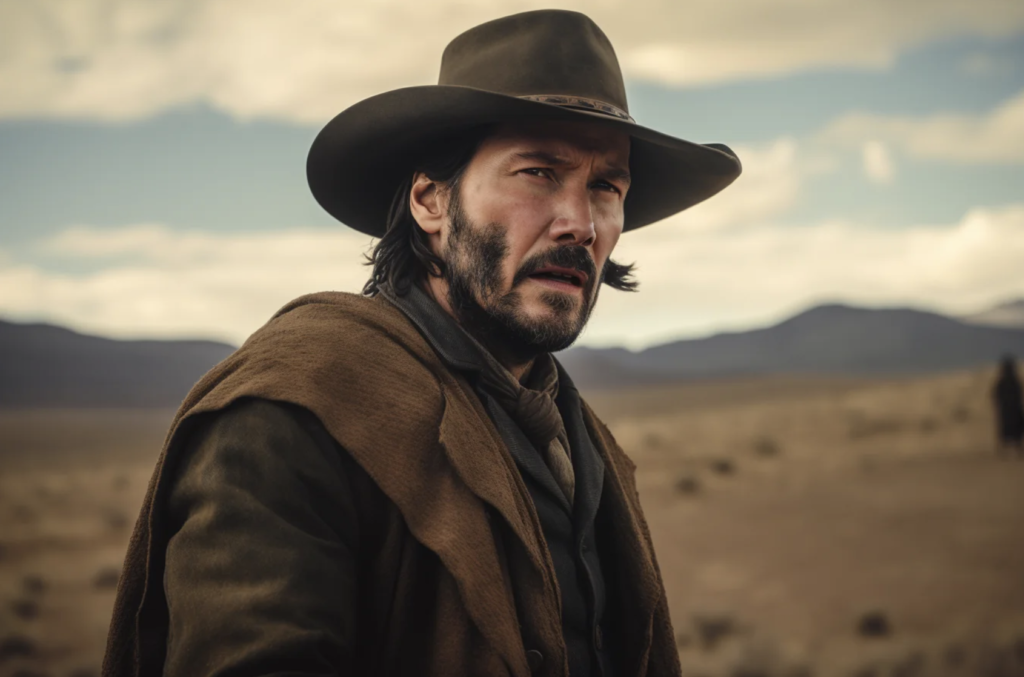
Why a Western?
Cause I haven’t read a Western in a while. Geez!
Also, it gives me the opportunity to say something controversial which you’re free to debate in the comments section. Of all the genres I read, Western writers deliver the most consistently. There’s somethign about exploring that time and pace that draws a more sophisticated kind of author.
Let’s see if Weary Ride The Belmonts lives up to that standard.
It’s the New West. Or the end of the Old West. It’s towards the end of the cowboy era is what I’m saying. A 53-year-old dude named Hoagy Belmont is living out in the middle of nowhere on the frontier. He likes his privacy this man. Mainly because he’s done unspeakable things and anyone who’d come to visit him would likely want to sever every limb from his body and leave the rest of him to cook in the sun.
Elsewhere, we meet another Belmont, Ophelia Belmont, Hoagy’s daughter. Due to a series of elaborate backstory details, Ophelia is under the impression that her father is dead. So she’s getting on with her life leading an enormous gang known as the Dead Souls who, when we meet them, are breaking out one of their high profile members from a moving train.
Meanwhile, our aging anti-hero is discovered. Hoagy is shipped to the town of Harperville where he meets Mayor Ingrid, a woman whose husband he happened to kill. Ingrid wants to kill Hoagy more than anything. But why kill one Belmont when you can kill two! So she takes a picture of Hoagy, sticks him in the morning paper, and tells the world, “Hoagy Belmont is still alive! And he’s going to be executed!” This way, Ophelia will see it, come to rescue her dad, and Ingrid gets to rid the world of Belmonts forever.
Ophelia and the Dead Souls, indeed, come charging into Harperville, only to realize that this town is PREPARED. They’ve got some next-level artillery set up for the Dead Souls. But will it be enough? The Dead Souls fight like they’re dead. They just keep coming and, eventually, overwhelm the town. But when Ophelia finally rescues her father, their reunion is not what we expected.
This isn’t your grandpappy’s Western screenplay, that’s for sure. Which is both the script’s biggest strength and primary weakness. It kind of feels like a “Western by way of Tik Tok,” blowing away my earlier theory that Westerns only draw in sophisticated writers.
With that said, that “Tik Tok” brand of writing brings energy. This script is like an atom bomb on top of a nuclear sub wrapped in Tesla batteries. Nobody’s going to accuse this writer of putting them to sleep. Every page is an aggressive affront on your eyeballs.
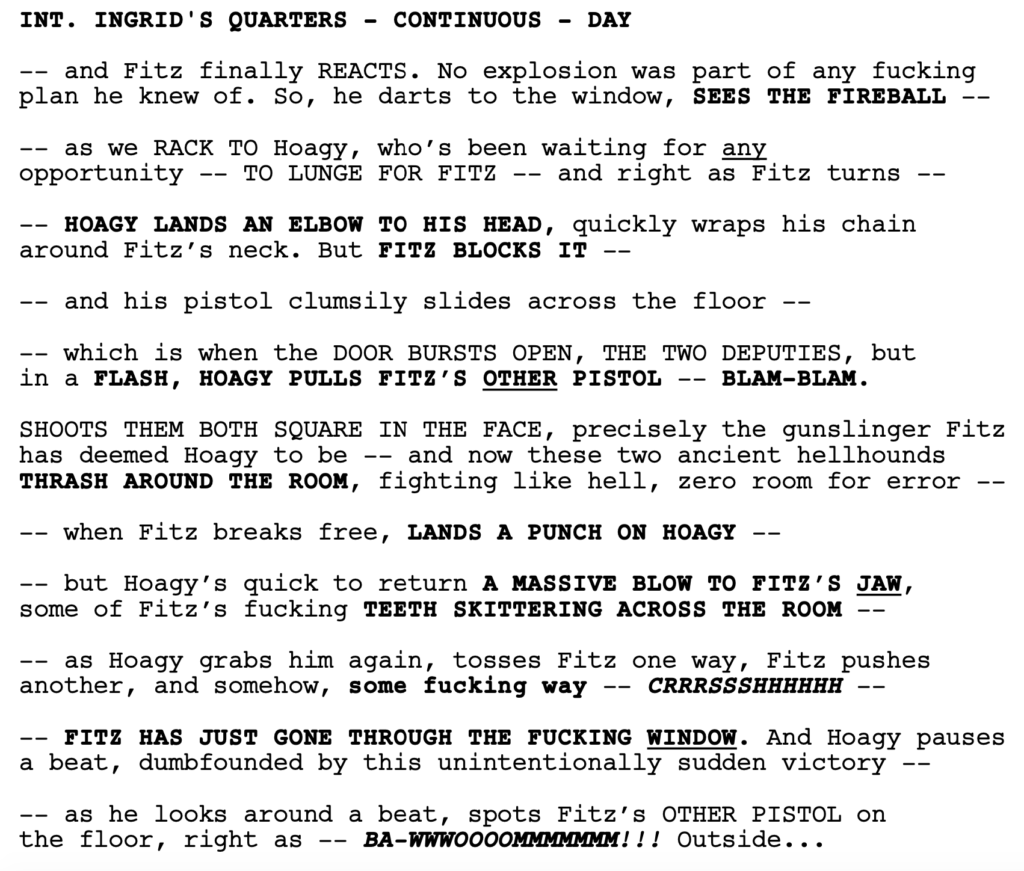
In addition to bringing the energy, Corbin does a good job of creating characters. That’s one of the best things about Westerns, is that they allow you to go to town with the characters. This is an era where people walked around with guns and settled scores with bullets to the head. That kind of character is going to be more exciting than your average dude.
When we first meet Hoagy, he slams a fork into a guy’s hand, pinning it to the table then takes a shotgun and blows the guy’s head off. When we meet Ophelia, she’s this crazy train-robber who has no issue killing anybody who gets in the way. The guy she rescues on the train is wearing a freaking owl mask. I also liked how evil all of the female characters were. Talk about subverting expectations.
If this script were only about characters, I’d give it a ‘worth the read.’
Unfortunately, the writer gets in his own way with the writing and the plotting.
Corbin writes with such recklessness that too many moments are ruined by his insanely over-the-top style. Here’s an example…
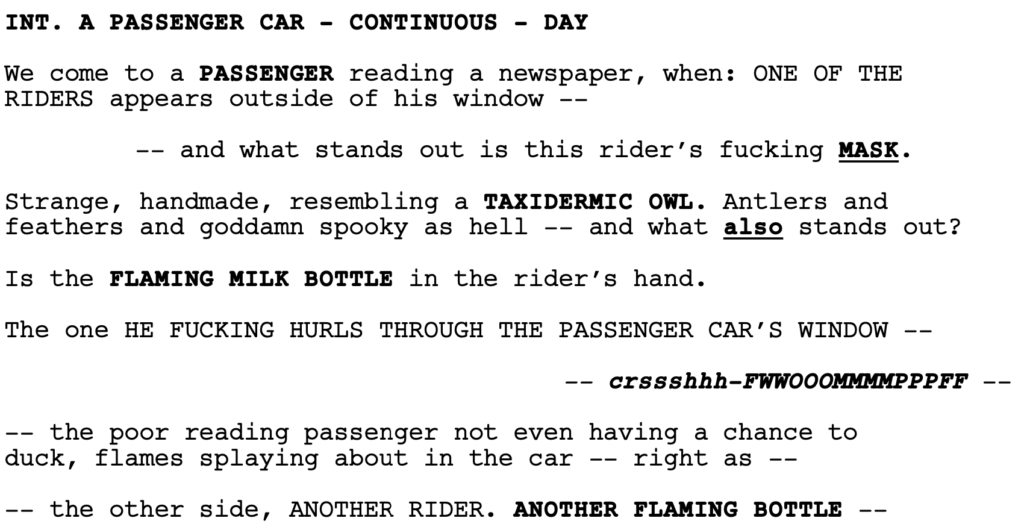
One of Corbin’s slug lines is: “INT. SOME F**KING SALOON SOMEWHERE F**KING ELSE NOW – NIGHT.” I offer that without comment.
I admit that when I first started writing, I used to write lines like this. It feels like you’re bucking tradition and demanding the reader pay attention. But, in reality, it displays a lack of self-belief. If you have to write this hard to keep the reader’s attention, you probably don’t believe in your story enough.
Which is accurate. The story here is muddled. We’re jumping around so much that we’re barely able to keep track of the 25 characters on display. Things do pick up when Ingrid captures Hoagy and we know Ophelia is coming for him. That’s actually the sequence where Corbin’s writing shines the brightest because it matches up with the craziness that’s happening (The Dead Souls storming the town).
But after that, there’s still 40 pages remaining in the script and we’re left to wonder, “Why are we still here? What’s left to figure out?” I guess there are some questions that need answering regarding why Ophelia hates her dad so much and what’s going to happen between them. But that’s the kind of question you want piggybacking on top of a bigger story goal, a story goal you just concluded.
From there, the script devolves into numerous flashbacks that fill in the gaps of our father-daughter backstory. But because the biggest plot beat is already over, I didn’t care. The script reminded me a lot of Across The Spiderverse. There’s so much you have to weed through to get to the point of the movie. But whereas that movie finally found its footing, “Weary” slips and falls down the mountain. It’s a victim of its own overwriting, which I wish the writer would’ve ditched at a certain point so we could focus on the story.
I would say to this writer that if he reins the bombastic writing style in, there’s a story here. But it’s lost inside one of the more aggressive writing voices I’ve ever come across.
[ ] What the hell did I just read?
[x] wasn’t for me
[ ] worth the read
[ ] impressive
[ ] genius
Free High Concept!: So, in the early train set piece in this movie, there is a PRISON PASSENGER CAR, a train car designed specifically to transport prisoners. I don’t know why I never knew that they did this in the Old West, but it’s a brilliant starting point for a movie. Pack that car full of the craziest Old West criminals you can think of, have it crash for some reason, and then unleash those criminals on a nearby city. Is this just “Con Air?” Yes! But it’s been 25 years since that movie. You can officially update the idea. And placing it in the Old West gives it a fresh spin. If this concept appeared in any logline showdown submission, it would be the first logline I would put up. This is a movie. It’s now a free idea. Go out there and write it, as many of you who want to. If enough of you like it, maybe we’ll do one of those contests where everybody writes a script from the same logline.
This juicy high-concept show starring Mahershala Ali will be Hulu’s next big buzzy “whodunnit.”
Genre: Thriller/Mystery
Premise: A once successful author does the unthinkable and steals a former student’s book idea after he learns of the student’s death. But after the book becomes a #1 bestseller, someone on social media begins taunting him, telling him he knows what he did.
About: Today’s author, Jean Hanff Korelitz, originally wanted to be a literary novelist, writing “important” and “thoughtful” character-driven stories. Until she realized the reality of her voice as a writer: SHE LOVED PLOT. Thus was born, “The Plot,” a book she said was the perfect writing experience. It shot out of her, uninterrupted, in six months during the pandemic. The sexy concept was quickly picked up by Hulu to turn into a series, which will star Academy Award winner, Mahershala Ali.
Writer: Jean Hanff Korelitz
Details:350 pages
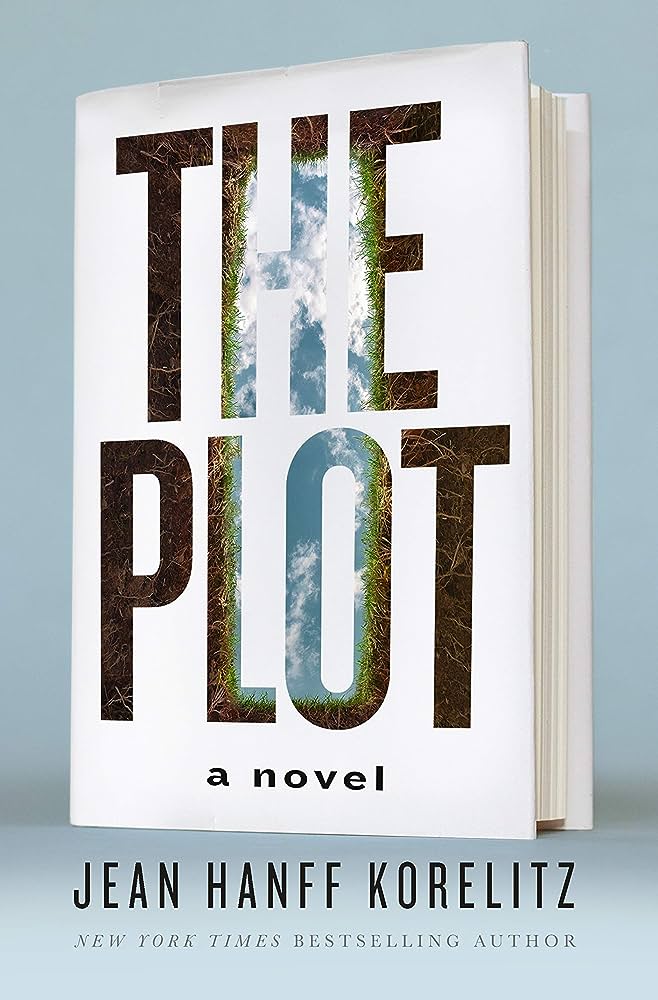
Since we’re talking about the power of concept today – coming up with that big juicy movie idea – I wanted to remind you guys that I do a “Power Pack” logline consultation for 75 bucks. You send me 5 loglines. I give you analysis, rate them on a 1-10 scale (don’t write a script that gets less than a 7!) I rewrite each logline, and I rank them from best to worst. This is great for writers trying to figure out what script to write next.
I also do a la cart logline analysis. It’s $25. Use my expertise of having been pitched over 20,000 loglines to know if your idea is truly worth writing. Just e-mail me at carsonreeves1@gmail.com
Okay, on to today’s review. We’re going to talk about a lesser-known sub-genre in the storytelling universe called the “walls are closing in” narrative. Now, the “walls are closing in” narrative has a couple of advantages and one distinct disadvantage.
What it offers is this impending feeling of doom as the truth begins to close in on our hero. You’ll see this in movies where the main character has killed someone and the cops come sniffing around. As the story goes on, we can almost physically feel all avenues of escape shrinking. The walls come from around, above, and below, squeeeeeeezing until they’ve entrapped our protagonist.
It’s a fun narrative because we’re hoping that the protagonist somehow figures out a way to escape.
But there’s a second advantage to these movies that not a lot of writers are aware of. Which is that the main characters are a lot more interesting than your average main character. They’ve obviously done something bad in order to be placed in such a situation. That life-changing mistake creates this internal battle that the character must fight off throughout the story. You know you’ve written good characters when the story stops and we still want to watch those characters. The main reason we’ll want to do this is because they’re going through some major internal struggle, which is exactly what the “walls are closing in” narrative provides.
But that leads us to the downside of these narratives, which is that the characters leading them are passive. Often times, with “walls are closing in” narratives, the main character is waiting around. They’re hoping they don’t get caught. At best, the characters are running around, defensively protecting themselves from being discovered.
As you may know, the best stories are almost always stories where the main character is active. He’s going after something. Let’s see how The Plot addresses this.
Jacob Finch Bonner was once a prodigy. His book, “The Invention of Wonder” was critically acclaimed and became a New York Times best-seller. But it’s been a decade and, two books later, Bonner is seen as an also-ran, one of many famed authors who fell off a cliff.
It’s gotten so bad that Jacob was forced to accept a teaching position at a writer’s summit in a small college called Ripley. Dozens of writers paid to come and learn writing from real authors for a month and then went off and tried to apply their newfound knowledge to their own novels.
While there, Jacob meets the most pompous writer ever, a handsome kid named Evan Parker, who has the gall to tell Jacob that he doesn’t need any writing help. He already knows he’s a great writer. He just needs contacts for when he finishes his book, a book, he claims, that will be one of the best books ever.
Jacob internally laughs this off but then, in a private meeting after class, he asks Evan to tell him about the book and Evan does. Jacob is shocked to learn, as Evan goes through the plot, that it, indeed, will be one of the best books ever written. There’s no hesitation in that analysis. The story, which includes a whopper of a twist, is *that* good.
The summit ends, everyone goes their separate ways, and three years later, out of curiosity, Jacob looks up Evan Parker. He’s confused why he hasn’t seen Evan’s book get published. As it turns out, Evan is dead. He died of an overdose.
It doesn’t take Jacob long to decide what he’s going to do. He’s going to write Evan’s book. And he does. Cut to three years later and Jacob is back on top of the publishing world. But “Crib’s” success dwarfs anything he experienced with The Invention of Wonder. Even Oprah wants to interview him.
Evan even gets a wife out of it! A producer on a Seattle radio show named Anna first falls in love with the book, then with the man who wrote it. And Evan is living every writer’s dream. Until one day, on his website, someone leaves a comment: “You are a thief.” From that point on, Jacob’s dream becomes a nightmare.
Not because anyone is trying to kill him. Because now every minute of Jacob’s life is a minute lived in fear. Will today be the day he’s exposed? At first, the comments come every couple of months. But the mystery person gets on Twitter and starts telling anyone who will listen, that Jacob stole “Crib.”
It gets to the point where the publisher finds out and now they want to know what’s up. Jacob, of course, tells them it’s a lie. But it’s getting bad enough that he can’t just wait around anymore. So Jacob heads back to Ripley College, the area where Evan Parker lived, to see if he can learn anything about who Evan was close with, in the hopes of finding the troll. What he learns is that he already knows the answers to his questions. Because the answers are written in his book.
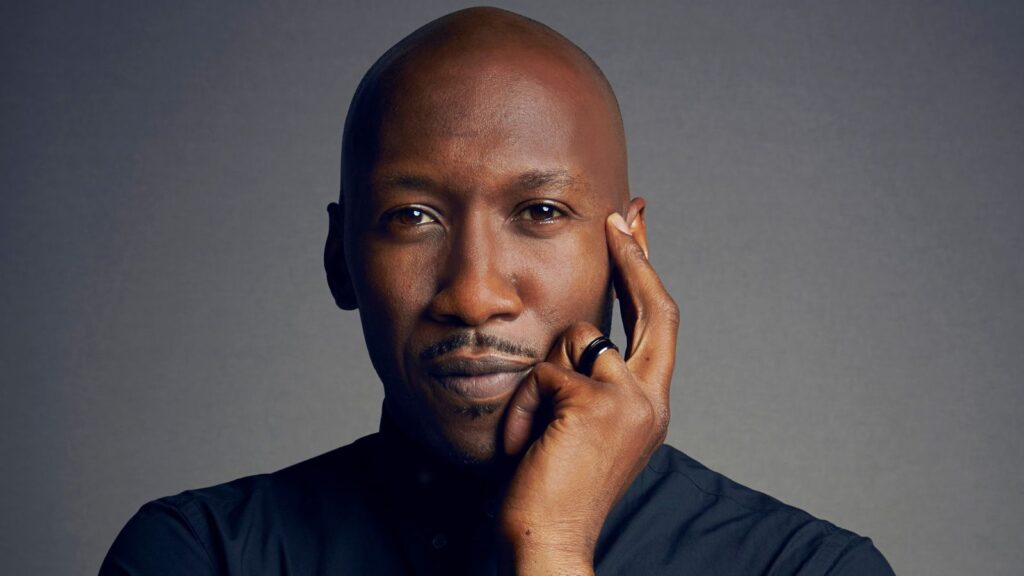
“The Plot” is a great example of how to come up with a low-key high-concept idea. When you think of high concept, you usually think of something involving dinosaurs, time travel, switching faces. But there’s this whole other range of options below the high-profile versions of high concept that can give you a more affordable great idea.
Some low-key high concept movies that come to mind are Double Jeopardy, Her, Eternal Sunshine of the Spotless Mind, Groundhog Day, Memento, Limitless, and Yesterday.
A writer who steals a concept from a dead writer only to learn, after his outsized success, that someone knows his secret, is indeed, a juicy setup for a movie (or, these days, a show) that isn’t going to break the bank. Which is why everyone on this site should familiarize themselves with low-key high-concept. Still, to this day, it’s one of the best ways to skip the Hollywood line.
And like I said at the outset, the idea lends itself to a fun “walls closing in” narrative, which I think the writer executes well. That first message Jacob gets (“You are a thief”) reminded me of that famous 90s horror thriller line: “I know what you did last summer.” I was scared for Jacob. Because it’s a unique threat in that there’s nothing you can do about it. At least not yet. All you can do is wait and hope that it somehow goes away, even though you know it won’t.
But what impressed me about The Plot is the thing that I keep telling every writer to do. Find a familiar concept/format/genre/plot and put a spin on it. The Plot is a “whodunnit”….. EXCEPT THERE’S NO MURDER. That’s what makes it unique. Once Jacob decides to do something about this troll, he becomes an investigator. He travels to Evan’s old town to learn about him and, hopefully, figure out who’s sending him these messages.
By the way, that’s how the book handles the “walls are closing in” weakness. It gives its main character a goal of finding out who’s posting these comments. That makes him active. So he’s not standing around the whole show.
Ironically, it isn’t the plot that puts this book on top. It’s the thing that the author claims to be least interested in: character. Because what this story is really about is the struggle of being a fraud. It’s a lot like “Yesterday” in that sense. You have everything you’ve ever wanted. But do you really have it if you ripped off the idea from someone else?
And that’s where The Plot becomes its most interesting, at least for fellow writers. Because it gets into a nuanced discussion about what constitutes “stealing.” Jacob wrote every word of this book. He didn’t use a single line of Evan’s work. So did he really steal? Evan had this plot. And he had this amazing twist. But Jacob wrote it. And that’s what he’s holding onto to keep his sanity. He keeps reminding himself that he wrote everything. But is he just doing that to feel better about what he’s done?
The big weakness in the book is the excerpts from the novel, “Crib,” that Jacob wrote. It’s supposed to be this amazing novel (it basically follows a toxic mother-daughter relationship) but nothing in Crib is as good as anything in the novel we’re reading, “The Plot.”
With that said, “Crib” starts to get juicier towards the end when we realize that the characters in “Crib” were Evan’s mother and sister. Now, if someone tells the world what happened to Evan’s mother and sister, it will clearly expose Jacob as having stolen the story from someone else.
I’m back and forth on whether this should be a series or a movie. Ideally, it would be something between the two. That’s always been the problem with novel adaptations. They’re always too big to be a movie and too small to be a TV show. So if you’re going to make a TV show, you need really good writers who can expand on the detail within the novel to keep the story moving during episodes 3, 4, and 5, where a lot of these bad 1-season TV shows die out.
But I think it’s going to work. Ali is great casting because he looks trustworthy. And I could see him depending on that to gain trust from family, friends, fans. Whereas, internally, he’s the biggest fraud in the world, something you’re typically not expecting with that actor. Remember everyone, one of the best ways to create great character is to make what’s happening inside of them and outside of them as opposite as possible. Success, fame, recognition outside. Shame, fear, feel like a fraud inside. That’s what’s going to make this show work.
[ ] What the hell did I just read?
[ ] wasn’t for me
[xx] worth the read
[ ] impressive
[ ] genius
What I learned: This is a major spoiler WIL. You’ve been warned. Whoever your “killer” is needs to be treated like every other character throughout the novel/script. Anna, Jacob’s wife, is treated so oddly throughout this story. She’s never around. Whenever she is around, she’s a wallflower. Whenever she talks, she’s very non-specific, vague. Meanwhile, every other character gets a super-detailed life. Anna is treated so differently that we know something is up with her. And, of course, she turns out to be Evan’s sister. She’s the one who’s been threatening him. Whenever you have a twist ending, you want to put yourself in the reader’s shoes and ask, “Who would they think the killer is?” Then make sure, whoever they’d think it is, NOT TO MAKE THAT CHARACTER THE KILLER. Not enough writers realistically evaluate readers when they do this.
What I learned 2: What you want to do instead is let Anna (or whoever your version of Anna is) be the disco ball. She’s the pretty shiny thing we’re all looking at over here so you can shock us at the end with that guy/gal we weren’t expecting at all.
Time to compare a plot-driven script with an anti-plot-driven script

There are two things I can promise you. Number one, In and Out has the most consistently good cheeseburgers on the planet. And two, there has never been, nor ever will there be, a screenplay analyst who compares Spider-Man Across the Spiderverse and Sanctuary. I am the only one.
That’s right. I finally watched Spider-Man: Across The Spiderverse, the animated sequel to Spiderman: Into the Spiderverse.
It’s always been hard for me to take these animated movies seriously. I think, “If it was a good script, they’d make it live-action.” It brings me back to all those Disney animated movie sequels that went straight to video. “Simba Learns Salsa.” “The Little Mermaid and Paco the Parrot.” “Abu and Jafar: Oops What Happened to My Flying Carpet?”
But this Spiderman movie did really well, it got great critic scores, and it’s been recommended to me by a handful of people.
So I watched it.
And I didn’t like it.
I just don’t think these movies are for me, man. It took me 45 minutes just to get used to the style of animation, which looked like a 3-D movie without the 3-D glasses. I had to put 100% of my focus into not getting annoyed by the faded muddy backgrounds.
Once I got past that, I could see what fans of the film liked. It’s a surprisingly heartfelt film. There’s a lot of emotion here, explored mainly between children and their fathers. When you’re young and trying to find your way in life, you can feel confused and lonely. And during those times, you really need your parents. And when they don’t see things the way you do, you feel more alienated than ever. I thought this movie captured that well.
I also thought the soundtrack was amazing. Whoever was in charge of the music of this movie deserves an Academy award because, like I said, most of the time I was annoyed by the animation. But, even then, I was feeling things because the music did such a great job of pulling me in.
For those who haven’t seen it, Spiderverse has an extremely complicated plot, so I’m going to simplify it for you. Miles and Gwen are both “Spider-Man” in their own universes. When a spotted villain who has the power to create black holes that he can seamlessly jump through, trips up the multiverse circuitry, a series of “canon” malfunctions happen, putting the multiverse in danger.
Gwen takes Miles to “Spider-Verse” which is an MIB like headquarters where the millions of different Spider-Men across the universes hang out. It’s there where Miles learns that, in every universe, a Spider-Man loses a loved one. And Miles’s timeline is about to kill off his loved one, his father.
If Miles saves his father, it destroys the multiverse and everything in it. If he doesn’t save his father, well, then his father’s dead. Obviously, he’s going to try and save his dad. Except that a million Spider-Men are determined to stop him. So he has to pull out all the spider-stops if he has any chance at protecting daddy.
While you process all that, let’s jump into the other movie I saw this weekend, an indie movie called, “Sanctuary.”

The reason I even know about this film is that it has two of my favorite young actors in it: Margaret Qualley (playing Rebecca) and Christopher Abbott (playing Hal). The writer, Micah Bloomberg, has a bit of pedigree. He’s the guy who created the buzzy Homecoming podcast, which went on to become a big Amazon adaptation (Sam Esmail, Julia Roberts), which he also wrote. The director, Zachary Wigon, directed one episode of that series, which, I’m guessing, is how they connected.
Sanctuary blew me away with its opening act. Granted, it works better if you don’t know anything about the movie going in (that’s your cue to go watch it now and come back). But it’s really clever stuff, which is one of the more elusive tools in the screenwriter toolkit. Are you clever? Cause if you can consistently outsmart the reader, you can gain a lot of fans.
In the first act, Hal, a seemingly well-off businessman, is visited in his ritzy hotel room by Rebecca, a lawyer from the firm that’s considering Hal for their new CEO job. Rebecca is here to do some last-minute diligence for the firm to see if Hal is right for the job.
They sit down at a small boardroom table and she begins to question him on things. Have you ever been arrested? Do you have any history of alcohol abuse? Questions like that. Much of the dialogue is sophisticated with splashes of humor.
Rebecca: Do you abuse prescription drugs?
Hal: Do I abuse prescription drugs?
Rebecca: Is that question confusing?
Hal: I take prescription drugs. I don’t know how they feel about it.
About midway through the interview, Hal starts to get annoyed. Only after some back-and-forth do we realize that not everything is as it seems. Rebecca is not a lawyer. She’s a dominatrix. Hal is not gunning for a CEO job at another corporation. He’s her client. And Hal has specifically written this script out for Rebecca ahead of time. What he’s getting annoyed by is that she’s going off-script.
This is another tool every writer should have in their toolkit – the scene-flip. We all think we understand what’s happening in a scene. But then, midway through the scene, the writer flips the script (literally) and it turns out we’re reading something completely different.
This is an especially effective device for the first scene of your screenplay. The reader has zero context for what they’re watching, which means they have no choice but to take everything you’re telling them at face value. This is what allows you to trick them so easily with the scene-flip.
After that opening scene, we see Hal and Rebecca, together, in a celebration of sorts. It seems to be part of their routine. After they get done with a session, they order in food, eat, and chat. I guess it makes it a little less icky than if he immediately kicks her out. She *has* been preparing for three weeks.
When this second scene arrives, we get another “flip” of sorts. They change into completely different people. He’s more fun and casual. She’s more shy and careful. This is not only a fun screenwriting thing to do. It pulls double-duty because this stuff is like crack to actors. They get to play two-roles for the price of one.
In less than 30 minutes, this screenplay has completely captivated me.
Okay, so, what does this have to do with Spider-Man?
What’s so fascinating to me is that these movies are attempting to do completely different things when it comes to plot. And you can extrapolate this to most movies that are either “Hollywood” or “Indie.” But you can really see the differences with these movies because they represent the extremes.
Spider-Man is drowning in plot. It has so many different universes. It has all these Spider-Men we have to get to know. We have the villain and what he’s trying to do – which requires an entire subplot to set it up. We have a “Super” Spider-Man guy, Miguel, who’s leading the charge on fixing the multiverse. I don’t think we get to the midpoint before we learn what this movie is really about – Spider-Man saving his dad.
Meanwhile, with Sanctuary, there’s virtually no plot. After that opening scene, we learn that Hal’s father, a hotel magnate, just died. And he’s taking over the company. Much of what Hal and Rebecca have done in her dominatrix sessions is help him be assertive – learn to stand up for himself and go after what he wants. He tells her that he’s ending their relationship because he’s finally “ready.” She wants to be fairly compensated for getting him to this place, so she starts demanding money. And that’s pretty much it. That’s the plot.
Note how, with Spider-Man, the writers’ primary job is to figure out how to get all of the plot stuff (via exposition) out of the way as soon as possible so the movie can just have fun. But because there’s so much to set up, it takes them all the way until the midpoint. Only then can Spiderverse breathe.
Meanwhile, since Sanctuary barely has any plot, it runs out of it fast and must start searching for it. We get a five minute “searching for a hidden camera” scene at the 30 minute mark because the writer has to figure out how to fill up at least 90 pages.
It’s funny, when you think about it. When a movie like Spider-Man Across the Spiderverse dies, it is because it has too much going on. There’s too much to manage. The reader gets so frustrated trying to keep track of everything, they give up. Movies like Sanctuary die for the opposite reason. There isn’t enough meat on the bone. The plot is so thin that the script inevitably finds itself in these giant valleys searching for a reason to exist.
This is a long way of me saying, you want to know which kind of writer you are because then you can write the kinds of scripts you’re good at. If you’re more of a technical writer who’s good at managing giant chunks of exposition that you’re able to easily hide in your script, the big Hollywood movie is more for you. If you’re a more creative writer who is good at finding powerful character moments so that you don’t miss a beat when the plot runs thin, then character pieces are probably for you.
As for these movies, neither of them are perfect. I’ll give Spider-Man this: It felt original. Which was a nice change from these live-action superhero movies that have all felt the same lately. And then with Sanctuary, it does struggle with those no-plot valleys. But Bloomberg knows how to write. He knows how to keep the character conflict going during those softer plot moments, enough to keep us invested. For that reason, Sanctuary will probably end up on my Top 10 list this year.
We check out two First Page Entries and glean what it takes to write a great first page.

Instead of doing a Logline Showdown this month, we are doing a FIRST PAGE SHOWDOWN. You send me the first page of your script, I put the best five first pages up on the site, the readers of the site vote for their favorite, the winner gets a script review the following Friday.
Can you follow in the success of the wonderful Wayward Son? Only way to find out is to enter!
What: First Page Showdown
Send in: Title, Genre, Logline, and a PDF of the first page of your script
Deadline: Thursday, September 21st, 10:00pm Pacific Time
Where: e-mail all entries to carsonreeves3@gmail.com
As I’ve begun to read through the first page submissions, I noticed something. Some writers had sent in whatever first page was already in their script. Other writers re-thought their first scene to allow for the best first page possible. For example, there are a lot of submissions where a murder has just taken place.
What’s interesting about this is that, in a few of the cases, I’d already read the entire script. So I knew where the scenes were going. I knew that, in one case specifically, even though the first page was mundane, the scene itself would build to a fun climactic moment on page 7.
There isn’t anything wrong with writing a slow-build first scene. I actually think slow-build scenes work better than scenes that shock you from the outset.
HOWEVER.
I also realized from this exercise just how crucial it is to grab the reader right away. Does a great slow-build page 7 climax matter if they never get past the first page? For this reason, you should seriously consider reworking your first scene so that it has a great first page. I mean, how many times have you seen readers of this site give up on first pages in the Showdowns? 17 million?
With that in mind, I’m going to give you two first page entries. Me featuring these has no bearing on their potential inclusion in the showdown. I just want to share with you what a reader looks at as he’s reading a first page.

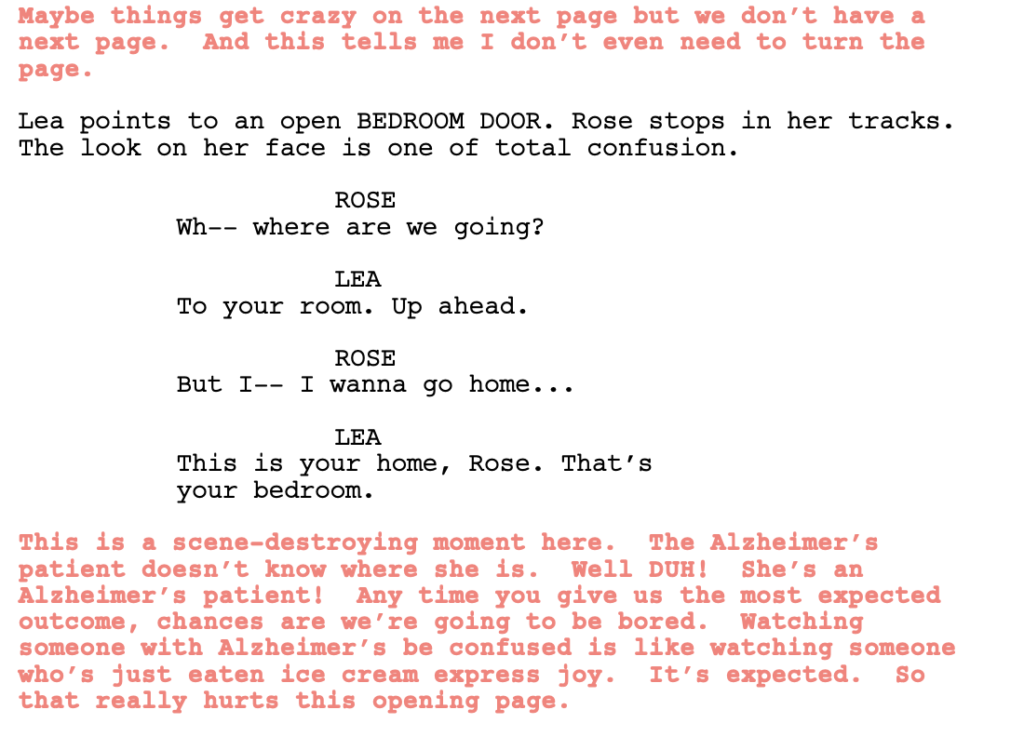 Before we rethink this scene, I want to acknowledge that maybe something earth-shattering happens on page 2. But taking that out of the equation, how could we have made this opening page better?
Before we rethink this scene, I want to acknowledge that maybe something earth-shattering happens on page 2. But taking that out of the equation, how could we have made this opening page better?
Well, we have an old person with dementia. We have a staircase. Why would you have them walk UP that staircase with help when you could have them walk DOWN that staircase with no help? Isn’t that a scarier more suspenseful scenario?
Maybe the opening shot is on Lea and her “Registered Dementia Specialist” tag asleep in a chair. Rose is up and walking along the second-floor hallway, looking out of it. She gets to the stairs, looks down them with a sense of confusion and fear. We highlight how delicate Rose is, how she would crumble if she fell. Then we milk that suspense. Is she going to walk down the stairs? Hang on that question for as long as possible.
Even if she didn’t start the walk down the stairs, that’s still a great first page. I GUARANTEE YOU every single executive in Hollywood who read that first page would read the second. And if they read the second, there’s a chance they’ll read the third. And the fourth. And so on.
Maybe our writer has a better scene than this written if we’d just kept reading. But this is the first page contest. You gotta hook us right away.
Here’s our second entry.
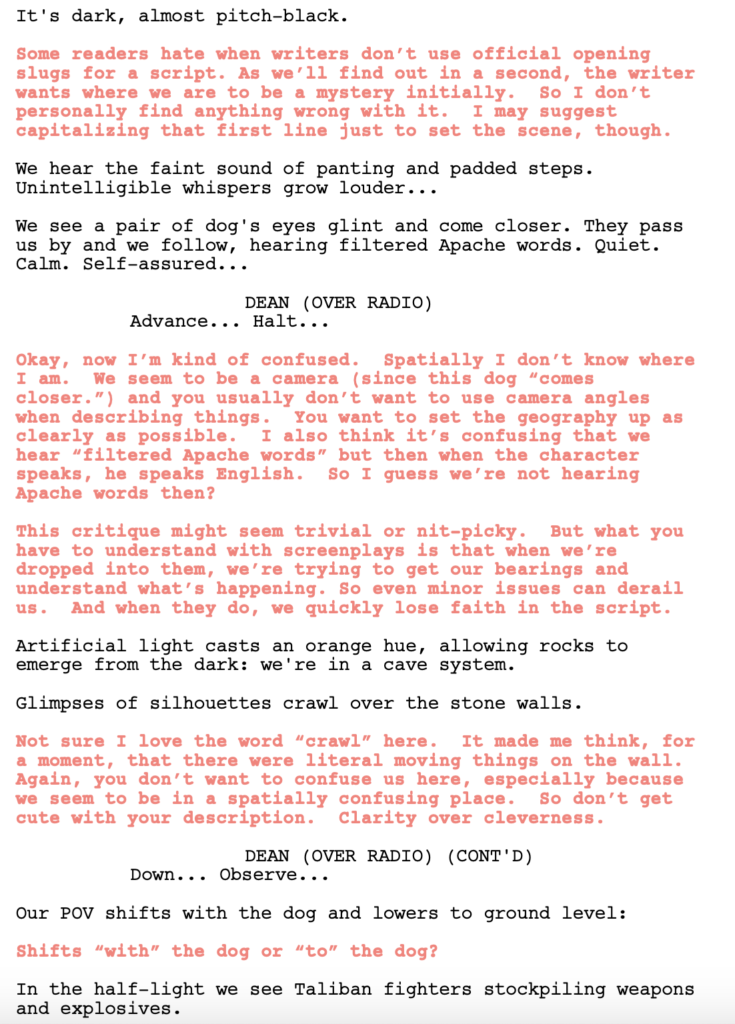
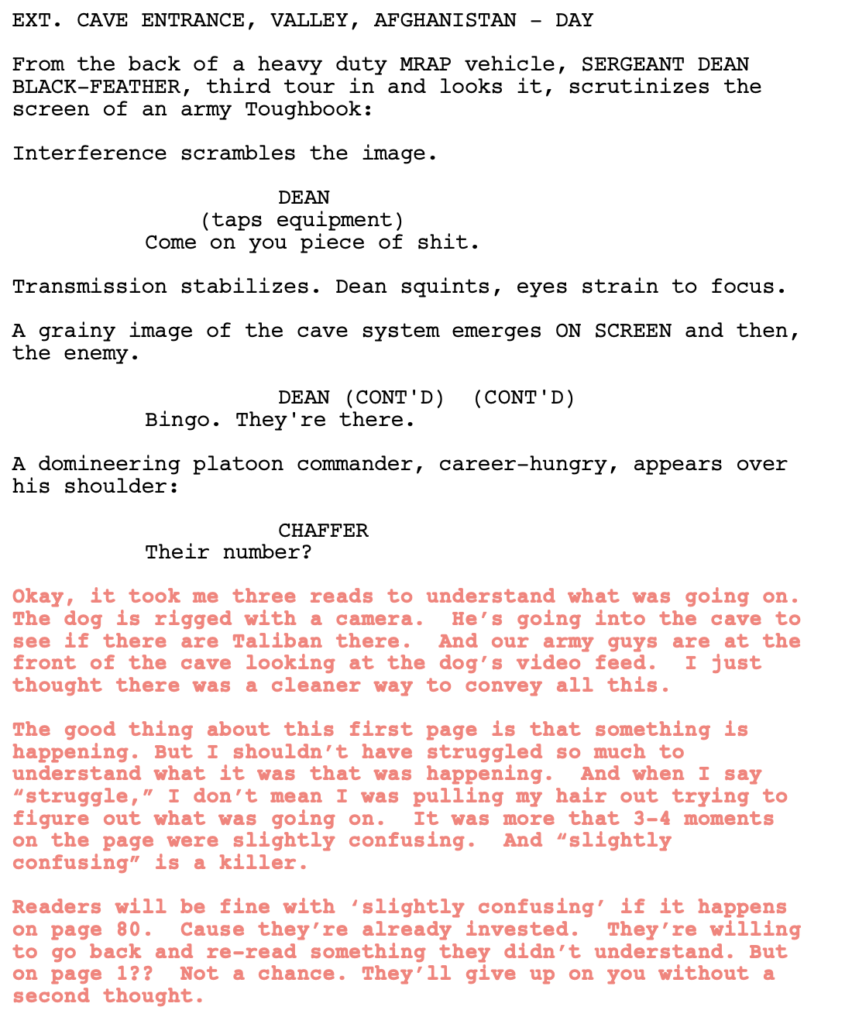 Would I keep reading here? Probably not. I give credit to the writer for starting off the story with something happening. This opening page promises major conflict if we keep reading. But for me it comes down to subject matter. I’ve read a million scripts about Afghanistan. What are you giving me that’s different here?
Would I keep reading here? Probably not. I give credit to the writer for starting off the story with something happening. This opening page promises major conflict if we keep reading. But for me it comes down to subject matter. I’ve read a million scripts about Afghanistan. What are you giving me that’s different here?
“But Carson, it’s only one page! I can’t give you something different on one page!” Yes you can! You can give me a quick page beat that’s unexpected, that’s unique, that focuses on something original that we don’t usually see in these screenplays. Competition is tough, guys. You don’t get to say, “Well, what you’re asking for is too much.” YOU’RE GOING UP AGAINST HUNDREDS OF THOUSANDS OF OTHER WRITERS. Decent first pages, which this is, aren’t enough.
I need you to embody that. Imagine just how much competition you have. And let that push your bar up higher. Cause that’s all this is. We all set a bar for ourselves. If that bar is too low, you’re not going to push yourself. So put it up high. Make it impossible for someone not to turn the page after your first page.
Keep sending those first pages in for First Page Showdown!

